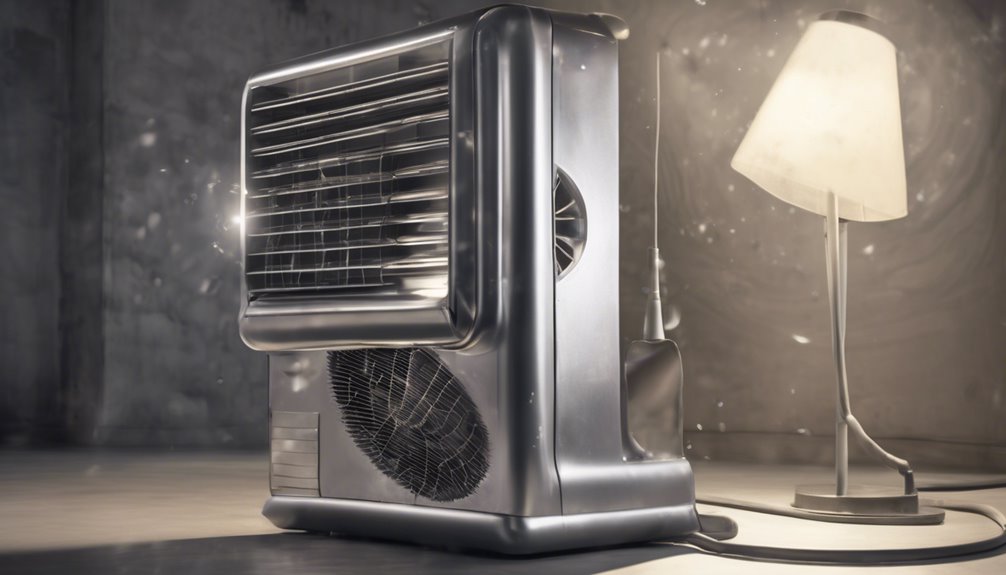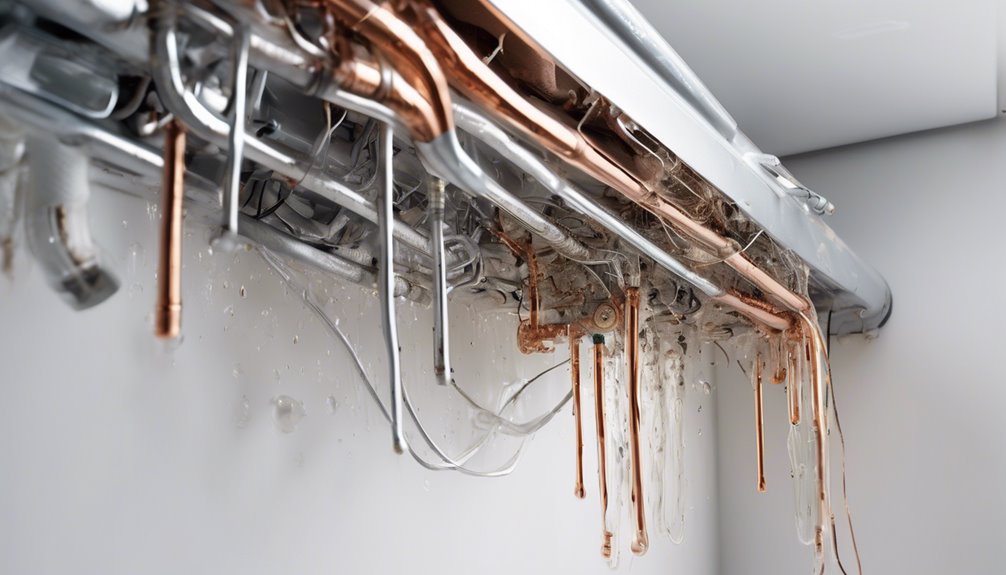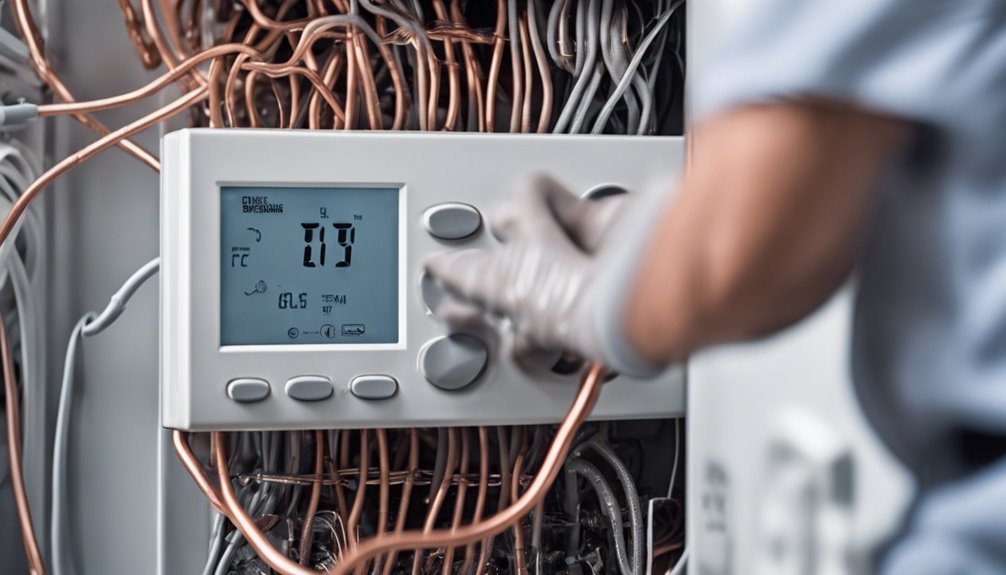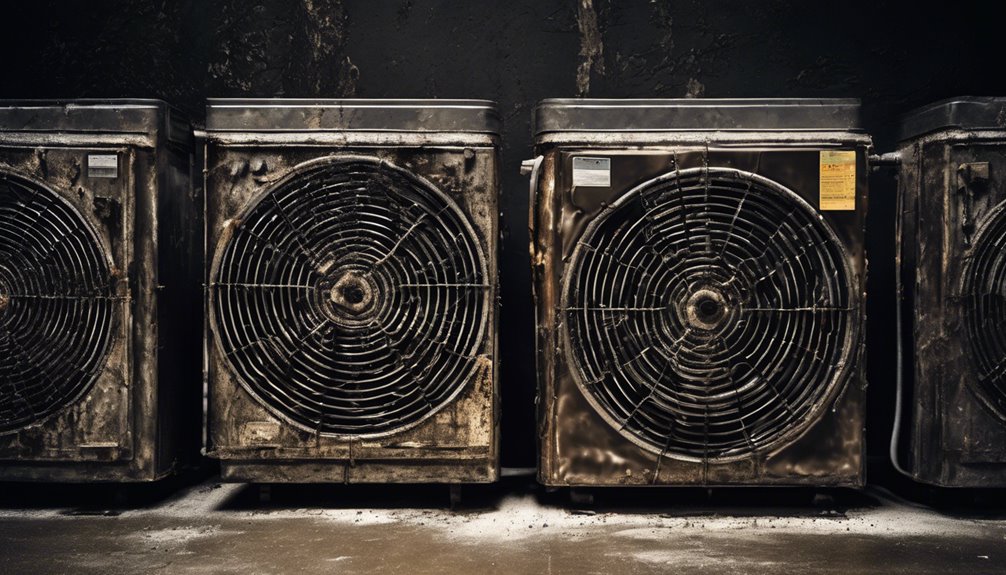Your AC blower is making noise because it's likely suffering from one or more underlying issues. Loose or worn belts, faulty motor bearings, or misaligned blower wheels can cause vibrations and noise. Dirty air filters, bent blower blades, or electrical problems with the motor can also be culprits. Additionally, refrigerant leaks, low refrigerant levels, or ice buildup on coils can contribute to the noise. Want to diagnose the problem and find a solution?
Key Takeaways
- Loose or worn belts can cause the blower to vibrate and produce noise, making regular belt inspections necessary.
- Faulty or worn-out motor bearings can cause a grinding or screeching noise, accounting for 70% of AC blower motor failures.
- Dirty or clogged air filters can reduce AC performance, leading to increased noise levels and energy bills, making regular cleaning or replacement crucial.
- Electrical issues with the motor, such as electrical surges or faulty wiring, can cause unusual noises, requiring prompt inspection and repair.
- Refrigerant leaks or low refrigerant levels can cause low pressure symptoms, including unusual noises, and addressing them promptly is essential to prevent further damage.
Loose or Worn Belts
If your AC blower is making a loud noise, it's possible that the belts are to blame.
Over time, belts can wear out or become loose, causing the blower to vibrate and produce noise. You should perform a belt inspection to identify the issue.
Check the belts for signs of wear, cracks, or damage. If you find any problems, it's likely you'll need a belt replacement.
Inspect belts for wear, cracks, or damage, and replace if necessary to eliminate AC blower noise.
This is a relatively simple and inexpensive fix. By replacing the belts, you can eliminate the noise and have your AC blower running smoothly again.
Remember to check the belts regularly to prevent future issues.
Faulty or Worn-Out Motor Bearings
If your AC blower is making a grinding or screeching noise, it's likely due to faulty or worn-out motor bearings.
You'll notice the noise is usually loudest when the blower is running at high speeds or under heavy loads. Look for signs of bearing failure, such as increased vibration, overheating, or a burning smell, to confirm the problem.
Bearing Failure Signs
About 70% of AC blower motor failures are attributed to worn-out or faulty bearings.
If you're experiencing unusual noises from your AC blower, it's likely due to bearing wear. As the bearings deteriorate, they'll start to produce distinct noise patterns. You might hear grinding, screeching, or whining sounds when the motor is running.
These sounds can be intermittent or continuous, depending on the severity of the bearing failure. If you notice any of these noise patterns, it's essential to address the issue promptly. Failing to do so can lead to further damage to the motor or even a complete breakdown.
Replacing Motor Bearings
One faulty motor bearing can bring your entire AC system to a grinding halt.
If you've identified bearing failure as the source of your AC blower's noise, replacing the motor bearings is the next step. When selecting replacement bearings, consider the bearing material – ceramic or stainless steel bearings are more durable and resistant to corrosion than traditional steel bearings.
This upgrade can lead to significant noise reduction, as well as improved overall system performance and longevity. Remember to follow the manufacturer's instructions and take necessary safety precautions during the replacement process.
With new bearings in place, your AC blower should run smoothly and quietly once again.
Misaligned or Unbalanced Blower Wheels
A misaligned or unbalanced blower wheel can be a significant contributor to the noise emanating from your AC blower.
A misaligned or unbalanced blower wheel is a common culprit behind noisy AC blowers, generating excessive vibration and turbulence.
When the blower wheel isn't properly aligned or balanced, it can cause wheel vibration, which leads to noise. Additionally, air turbulence created by the misaligned or unbalanced wheel can also contribute to the noise.
Some common signs of a misaligned or unbalanced blower wheel include:
- Increased noise levels when the blower is running
- Vibrations felt through the floor or walls
- Uneven airflow from the vents
- Squealing or grinding sounds coming from the blower
- Reduced airflow or efficiency of the AC system
Dirty or Clogged Air Filters
You're probably aware that your air conditioner's air filters need regular cleaning, but you mightn't realize the impact of neglecting this task.
A dirty or clogged air filter can significantly reduce your AC's performance, leading to increased noise levels and energy bills. If you haven't cleaned or replaced your air filters recently, it's likely contributing to the blower's noise.
Filter Cleaning Importance
Dirty or clogged air filters are a common culprit behind an AC blower making noise.
You mightn't realize it, but a dirty filter can significantly impact your air quality and filter efficiency. When your filter is clogged, your AC blower has to work harder to circulate air, leading to strange noises and increased energy bills.
To avoid these issues, make sure to clean or replace your air filter regularly.
Here's what you'll gain:
- Improved air quality by removing dust, pollen, and other allergens
- Increased filter efficiency, reducing the load on your AC blower
- Reduced energy consumption and lower utility bills
- Prolonged lifespan of your AC unit and its components
- A quieter, more peaceful living space
Clogged Filter Consequences
Failing to clean or replace your air filter regularly can lead to a cascade of problems. You might think it's no big deal, but a dirty or clogged air filter can have significant consequences on your AC's performance and your wallet.
| Filter Effects | Your AC | Your Wallet |
|---|---|---|
| Reduced Airflow | Increased Energy Bills | Higher Costs |
| Increased Pressure | Overworked Motor | Premature Replacement |
| Poor Air Quality | Unhealthy Indoor Air | Medical Expenses |
A clogged filter reduces airflow, making your AC work harder, leading to increased energy bills and premature replacement. Moreover, poor air quality can negatively impact your health, resulting in medical expenses. Remember, filter importance cannot be overstated. Regular cleaning or replacement is crucial to avoid these consequences.
Bent or Damaged Blower Blades
Bent or damaged blower blades can be a major contributor to the noise your AC blower is making.
If you're experiencing unusual sounds, it's essential to inspect your blower blades for any signs of damage. Over time, blades can become bent or damaged due to various factors, including dust buildup, improper installation, or physical impact.
- Perform regular blade inspection to identify any issues early on.
- Clean your blower blades regularly to prevent dust buildup.
- Avoid using harsh chemicals or abrasive materials that can damage the blades.
- Consider replacing bent or damaged blades as part of your routine blade maintenance.
- Consult a professional if you're unsure about inspecting or maintaining your blower blades.
Worn or Loose Mounting Hardware
As you've checked your blower blades for damage, it's time to shift your attention to another potential culprit behind the noise: worn or loose mounting hardware.
Over time, the screws, bolts, or clips that hold your blower motor in place can wear out or loosen, causing the motor to vibrate excessively. This vibration can lead to noise.
To inspect the hardware, turn off the power to your AC unit and locate the mounting hardware. Check for any signs of wear, rust, or corrosion. Make sure all screws and bolts are tightened securely.
If you find any worn or loose parts, replace them with new ones. Proper vibration dampening relies on secure mounting hardware, so don't overlook this crucial step in your noise-reducing mission.
Electrical Issues With the Motor
Your AC blower's motor relies on a steady supply of electricity to function smoothly.
Any electrical issues can cause the motor to malfunction, leading to unusual noises. If you're experiencing a motor hum or other strange sounds, it may be due to electrical problems.
Here are some possible causes:
- Electrical surge: A power surge can damage the motor's electrical components, causing it to vibrate or hum loudly.
- Faulty wiring: Loose or damaged wires can disrupt the motor's electrical supply, leading to unusual noises.
- Motor capacitor issues: A faulty capacitor can cause the motor to hum or vibrate excessively.
- Overheating: Electrical components can overheat, causing the motor to produce strange sounds.
- Bad bearings: Worn-out or damaged bearings can cause the motor to make grinding or screeching noises.
Refrigerant Leaks or Low Refrigerant
When you suspect refrigerant leaks or low refrigerant, you'll likely notice low pressure symptoms, such as reduced airflow or icing on the coils.
To identify the issue, you'll need to detect refrigerant leaks, which can be a challenging task.
The impact on system performance will be significant, so it's essential to address this problem promptly.
Low Pressure Symptoms
Low refrigerant levels or refrigerant leaks can cause your AC blower to make noise due to low pressure symptoms.
This happens when the refrigerant charge in your AC system is lower than recommended, affecting the air pressure. As a result, your AC blower has to work harder, leading to unusual noises.
During system diagnostics, a technician may check for these low pressure symptoms:
- Reduced airflow from the vents
- Increased energy bills
- Ice buildup on the coils
- AC not cooling the space effectively
- Unusual hissing or gurgling sounds from the AC unit
Refrigerant Leak Detection
As you've determined that low pressure symptoms are causing your AC blower to make noise, it's time to investigate the root cause.
One common culprit is a refrigerant leak, which can lead to low refrigerant levels. To detect a leak, you'll need specialized tools like refrigerant sniffers or leak detectors.
These devices can pinpoint the source of the leak, helping you identify the problem area. Some common areas where leaks occur include joints, valves, and copper lines.
Be sure to follow safety guidelines when handling refrigerant and inspecting your AC system. By detecting and addressing the leak, you can restore proper refrigerant levels and quiet your noisy blower.
System Performance Impact
A single refrigerant leak can have a profound impact on your AC system's performance.
It's not just about the noise; it's about the overall efficiency and effectiveness of your air conditioner.
When refrigerant leaks or is low, your system has to work harder to cool your home, which can lead to:
- Reduced system efficiency, causing your energy bills to skyrocket
- Increased air circulation issues, making your home feel less comfortable
- Overworked compressors, which can lead to premature failure
- Ice buildup on coils, further reducing airflow and efficiency
- Increased risk of system failure during peak summer months
Ice Buildup on the Coils
Ice buildup on the coils is a common culprit behind a noisy AC blower. When frost builds up on your coils, it restricts airflow, causing your blower to work harder and make more noise. To prevent this, you need to ensure your coils are clean. Coil cleaning importance cannot be overstated, as dirty coils lead to frost buildup, which reduces your AC's efficiency and increases your energy bills.
| Causes of Ice Buildup | Effects on AC Performance | Prevention Tips |
|---|---|---|
| Dirty coils | Reduced airflow, increased energy bills | Regular coil cleaning |
| Low refrigerant levels | Frost buildup, noisy blower | Check refrigerant levels annually |
| Clogged air filters | Restricted airflow, frost buildup | Replace air filters every 1-2 months |
Deteriorated or Worn-Out Blower Motor Capacitor
While ensuring your coils are clean is vital, another common issue that can cause your AC blower to make noise is a deteriorated or worn-out blower motor capacitor.
Over time, the capacitor can wear out, leading to strange noises from your AC blower. To diagnose the issue, you'll need to perform a capacitor inspection.
- The blower motor is making a humming or buzzing noise
- The AC isn't blowing air properly
- The capacitor is leaking or showing signs of physical damage
- The blower motor is running hot
- The AC is tripping the circuit breaker frequently
Frequently Asked Questions
Can I Fix the Noisy AC Blower Myself or Do I Need a Professional?
You can try DIY repairs, but if you're not comfortable with Blower maintenance, it's best to call a pro. If you're unsure, start by cleaning the blower and checking for loose parts, but if the noise persists, don't hesitate to seek professional help.
Will a Noisy AC Blower Increase My Energy Bills?
You're wondering if a noisy blower will hike your energy bills. Well, the answer is yes, as increased energy consumption is often correlated with noise levels, indicating reduced efficiency and higher costs.
Can a Noisy AC Blower Be a Sign of a More Serious Issue?
You're wondering if that annoying noise is a sign of something more serious. Yes, it can be! Faulty components or worn bearings might be causing the racket, and if left unchecked, they could lead to costly repairs or even system failure.
How Long Does It Take to Fix a Noisy AC Blower?
You'll be relieved to know that fixing a noisy blower can be a relatively quick process, often taking only a few hours. In some cases, quick repairs can silence the noise, but if it's worn out, you'll need to consider blower replacement, which can take a few days.
Will a New AC Unit Eliminate the Noise Problem Completely?
When you install a new AC unit, you'll likely eliminate noise problems caused by design flaws or installation errors, but it won't guarantee complete silence, as other factors like air flow and ductwork can still contribute to noise.
Conclusion
You've identified the source of the noise coming from your AC blower, now it's time to take action. Whether it's a loose belt, faulty motor bearings, or dirty air filters, addressing the issue promptly will prevent further damage and ensure your AC unit runs efficiently. Don't let the noise persist – schedule a repair or maintenance check to get your AC blower running smoothly and quietly again.



